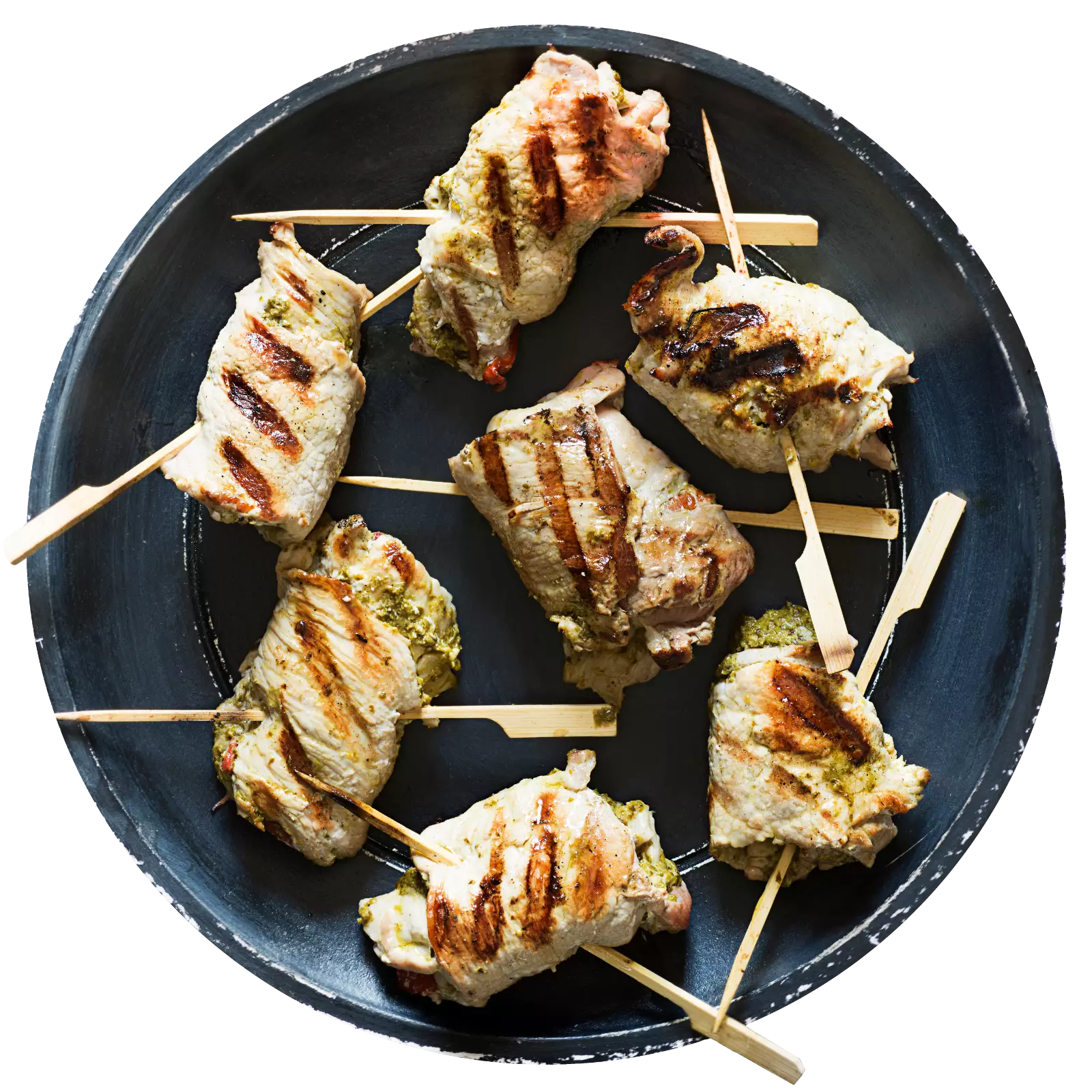Punch
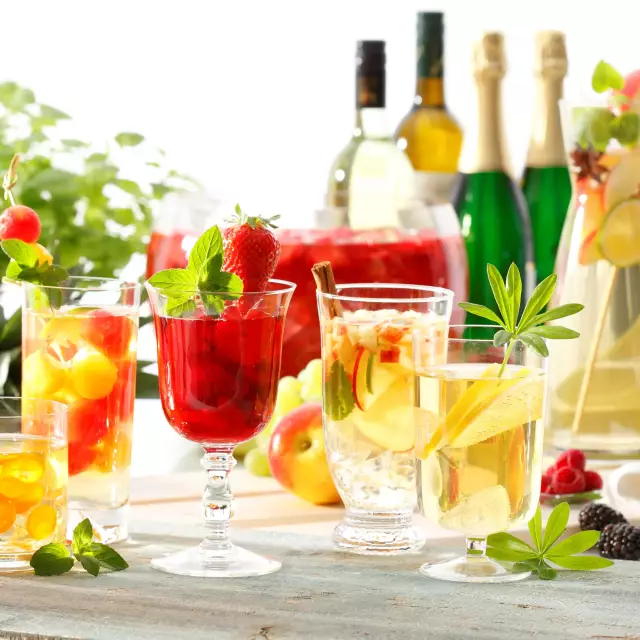
Punch is a refreshing summer drink made of wine, sparkling wine and fruit or herbs. Colourful, fruity and well chilled, this fizzy classic guarantees fruity enjoyment.
Facts
-
3-5
ingredients
-
18.
century
-
50s
years
There’s really not much you can do wrong with this fruity cocktail – if you keep a few simple basic rules in mind:
- The best punches only use a couple of ingredients.
- A punch is only ever as good as the wine or sparkling wine used in its making. German quality wine, a light Kabinett and fruity Winzersekt are excellent choices.
- Only use fresh and fully ripe fruit.
- Peel and chop the fruit carefully – do not crush it.
- To get the fruit to develop its full aroma, just sugar it lightly or marinate it in grape liqueur. If you prefer a sweet punch, use sweet wines.
- Only add – well chilled – sparkling wine and mineral water just before you serve the punch. This way, you’ll keep it fizzing for that much longer.
- The ideal serving temperature for a punch is 5-8 °C, slightly cooler than for wine.
Do not add ice cubes to the punch. This will water it down. Best place the punch bowl inside a larger bowl filled with crushed ice.
And another thing: Once the punch is dwindling, do not top it up. It’s better to serve a good wine after the punch is finished.
Strawberry punch
Prepare a large plate full of fresh strawberries. Cut larger strawberries in half or quarter them. Sprinkle with sugar and let them sit for a while to release their juice. Alternatively, marinate the fruit in grape liqueur. Next, place fruit and juice in a punch bowl and let them steep in a little wine. Later, add 4-5 bottles of wine, such as well chilled rosé or Weißherbst. If possible, place the punch bowl on crushed ice. Just before serving, add a bottle of German Winzersekt and enjoy.
Peach punch
Peel 6-8 ripe peaches, cut them in half and remove the stones. Sprinkle the fruit pieces with sugar and let them steep. Next, add 3-4 bottles of wine, such as Riesling or Silvaner, and let the mixture steep for a couple of hours, preferably on ice. Just before serving, add a bottle of German Winzersekt for that zesty finishing touch.
Kumquat punch
Wash 15 kumquats in hot water, dry them and cut them into thin slices. Sprinkle with brown sugar and add a little wine, such as Pinot Gris or a mature Riesling. Let the mixture steep for a couple of hours, then top up with 2 bottles of wine and leave it to steep for some more time on ice. Just before serving, add a bottle of Winzersekt for that delightful sparkle.
How punch got its name
The German term for the refreshing summer cocktail made of wine and fruit is Bowle, derived from the English word “bowl”. Allegedly, the cocktail was invented by British colonial officers in India. To invigorate themselves and to overcome the sheer boredom of Colonial life, they got their Indian servants to create drinks for them that used at least five – or “punch” in Hindi – ingredients. Those were then served to the officers in a large “punchbowl”.
Thus the British started the fashion for punches in Europe in the 18th century. Initially reserved to nobility, drinking punch soon became a favourite pastime in bourgeois circles as well. The favourite drink of the 19th century high society later became the party craze of the 1950s. Today, the cocktail is becoming fashionable once again as an invigorating, fresh and fruity drink for the summer.
Do you know any other kind of punch than the traditional punch?
Besides the traditional punch like Cold Whisky Punch, Roman Punch, Ginger Punch,... for which spirits like brandy and whisky are used, you can also use grape wines to make a punch. How to make it? Find out in this article!
Varietals

with semi-dry wines Flädlesuppe
with semi-dry wines
- 1 Bund Schnittlauch
- 1 Liter Fleischbrühe
- 150 Gramm Weizenmehl
- 300 ml Milch
- nach Belieben Speckschwarte zum ausreiben der Pflanne
- Etwas Salz
Make a smooth, not too thick batter from the flour, milk, eggs and a pinch of salt. Heat a heavy frying pan on a high heat, rub with bacon fat, pour in a small dollop of batter, allow to spread and fry thin pancakes (flädle).
<p
<p>Leave the pancakes to cool, halve and cut into thin strips.
Place in clear, very hot meat stock and serve immediately.
<p- Trollinger (halbtrocken & feinherb)
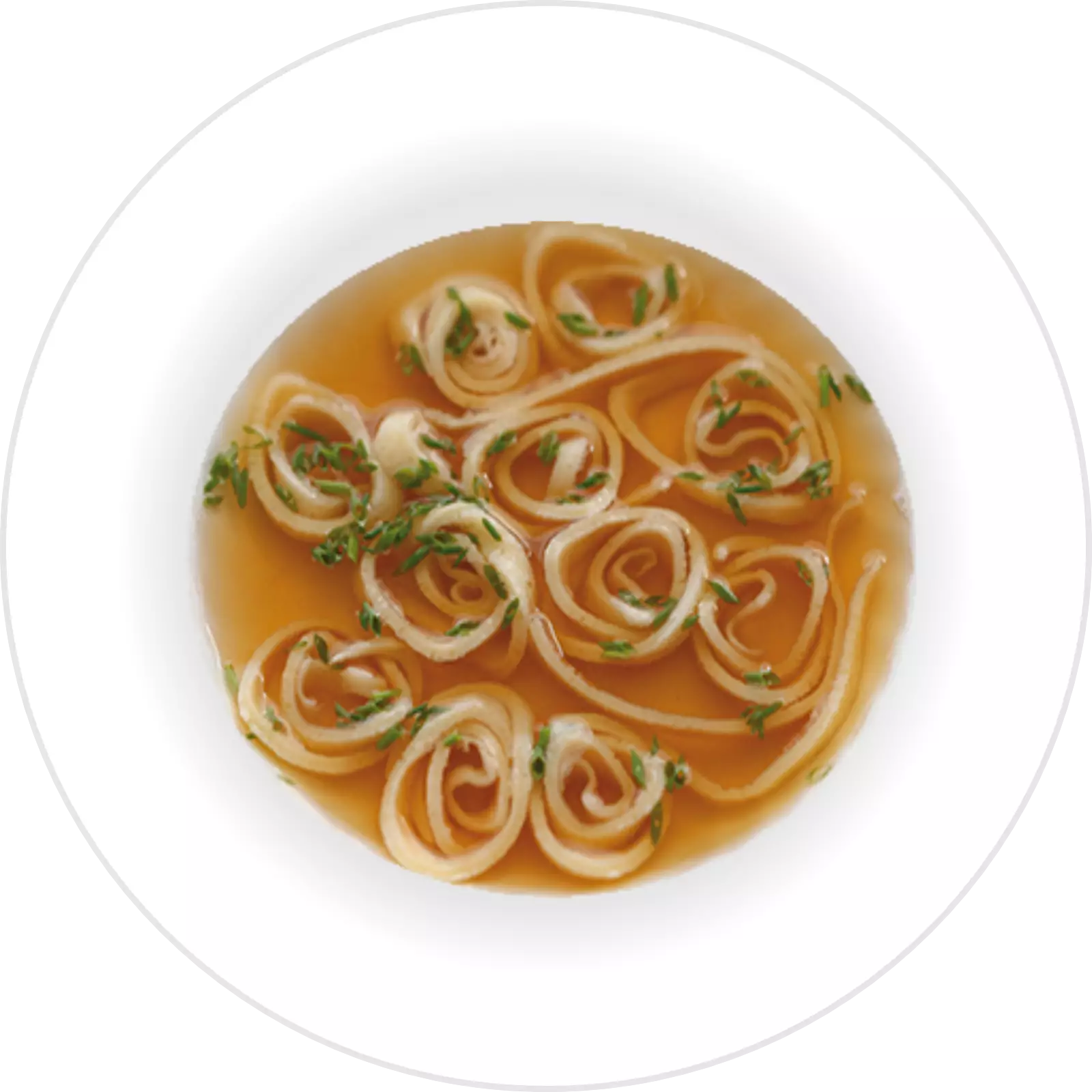
with fresh chanterelles Autumn bruschetta
with fresh chanterelles
- 4 Ciabatta-Brötchen
- 200 Gramm kleine Pfifferlinge
- 4 EL kleingehackte Petersilie
- 4 Zehen Knoblauch
- 80 Gramm Pecorino (Hartkäse)
- 8 EL kaltgepresstes Olivenöl
- Eine Prise Salz & Pfeffer
Preheat the oven to 200 degrees.
Clean the chanterelles. Sauté the parsley in a pan with half of the oil, then add the mushrooms and cook over a low heat for approx. 5 minutes.
Slice the rolls and bake for approx. 5 minutes until crispy.
Chop the garlic into small pieces, spread on the warm bread rolls and drizzle with the other half of the oil. Coarsely grate the pecorino.
Stir the chanterelle and parsley mixture into the pecorino and spread over the halves of the rolls.
- Pinot Gris (trocken)
- Federweißer (brut nature)
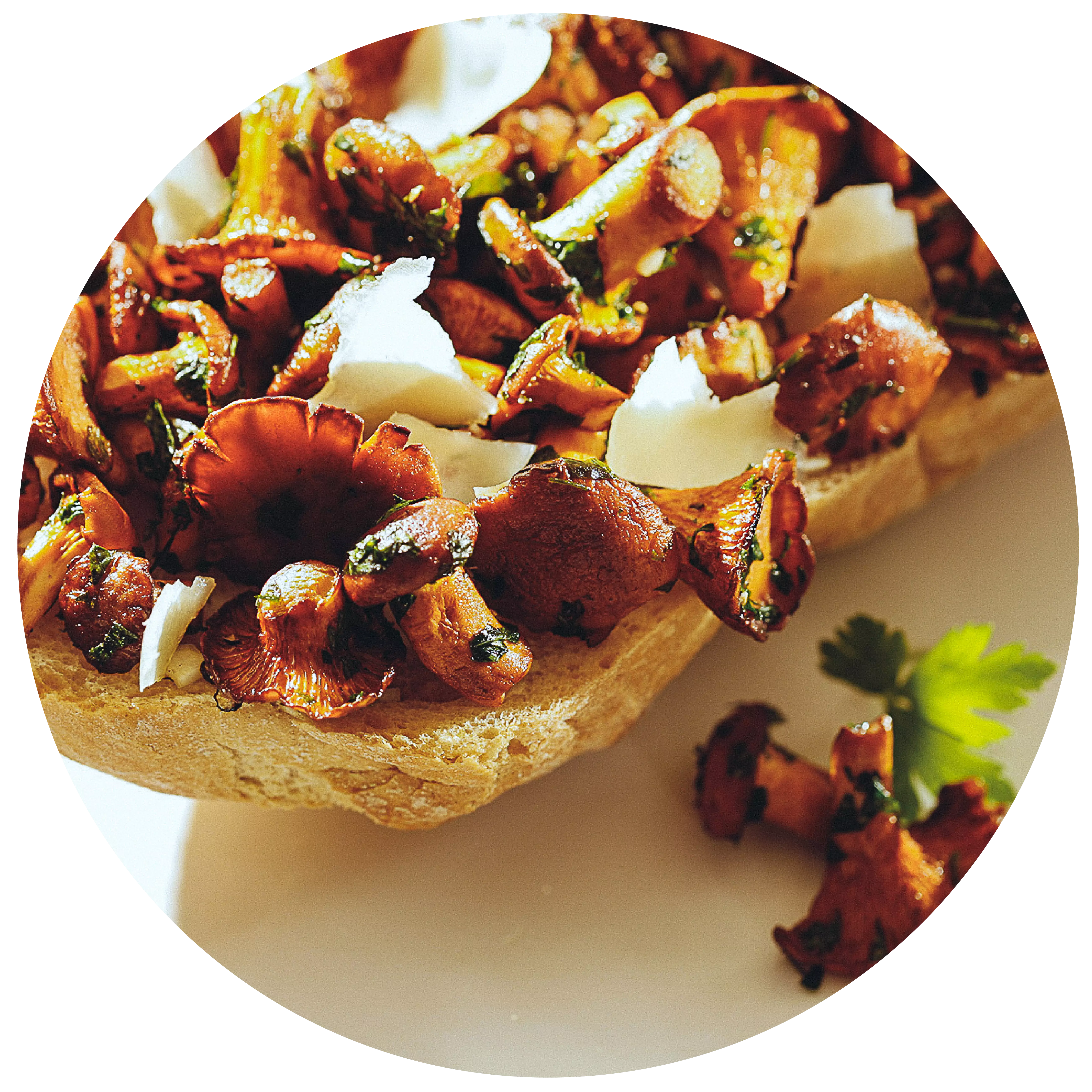
with bulgur Cabbage stew
with bulgur
- 200 Gramm Zwiebeln
- 1 ganze Knoblauchzehe
- 800 Gramm Spitzkohl
- 200 Gramm Möhren
- 400 Gramm festk. Kartoffeln
- 1 EL Kümmelsaat
- 1,5 Liter Gemüsefond
- 5 EL Olivenöl
- 2 EL Tomatenmark
- 2 EL edelsüßes Paprikapulver
- 3 TL Honig
- nach Belieben Salz & Pfeffer
- 120 Gramm grobe Bulgur
- 1 Bund Petersilie
- 4 Stiele Minze
- 1 ganze Zitrone
- 2 ganze Äpfel
- 3 EL Obstessig
Finely dice the onions and garlic. Clean, wash and quarter the cabbage, remove the stalk and roughly chop the cabbage quarters. Peel the carrots, halve lengthways and cut into approx. 2 cm wide pieces. Peel the potatoes and cut into approx. 2.5 cm pieces. Fry the carrots in a pan without fat and set aside.
Heat the vegetable stock in a small pan. Heat 3 tablespoons of oil in a large pan, sauté the cabbage in it for 10-15 minutes over a high heat until dark brown and remove from the pan.
Add the remaining oil to the pan. Fry the onions and garlic until translucent. Add the potatoes and muesli and sauté for 3-4 minutes, stirring constantly. Add the tomato purée and paprika powder and fry while stirring. Add the cabbage, honey and caraway and pour in the hot vegetable stock. Season with salt and pepper. Bring to the boil, cover and simmer for 45 minutes. Add the bulgur 20 minutes before the end of the cooking time.
Quarter the apples, remove the seeds, cut into approx. 1 cm cubes and add 10 minutes before the end of the cooking time. Pluck the herbs and chop medium-fine. Wash and dry the lemon, finely grate the zest and mix with the herbs. Flavour the stew with vinegar, salt and pepper and serve sprinkled with the herbs.
Tip: The pointed cabbage must be roasted really strongly and dark so that the aromas come out well.
- Spätburgunder / Pinot Noir (trocken)
- Trollinger (trocken)
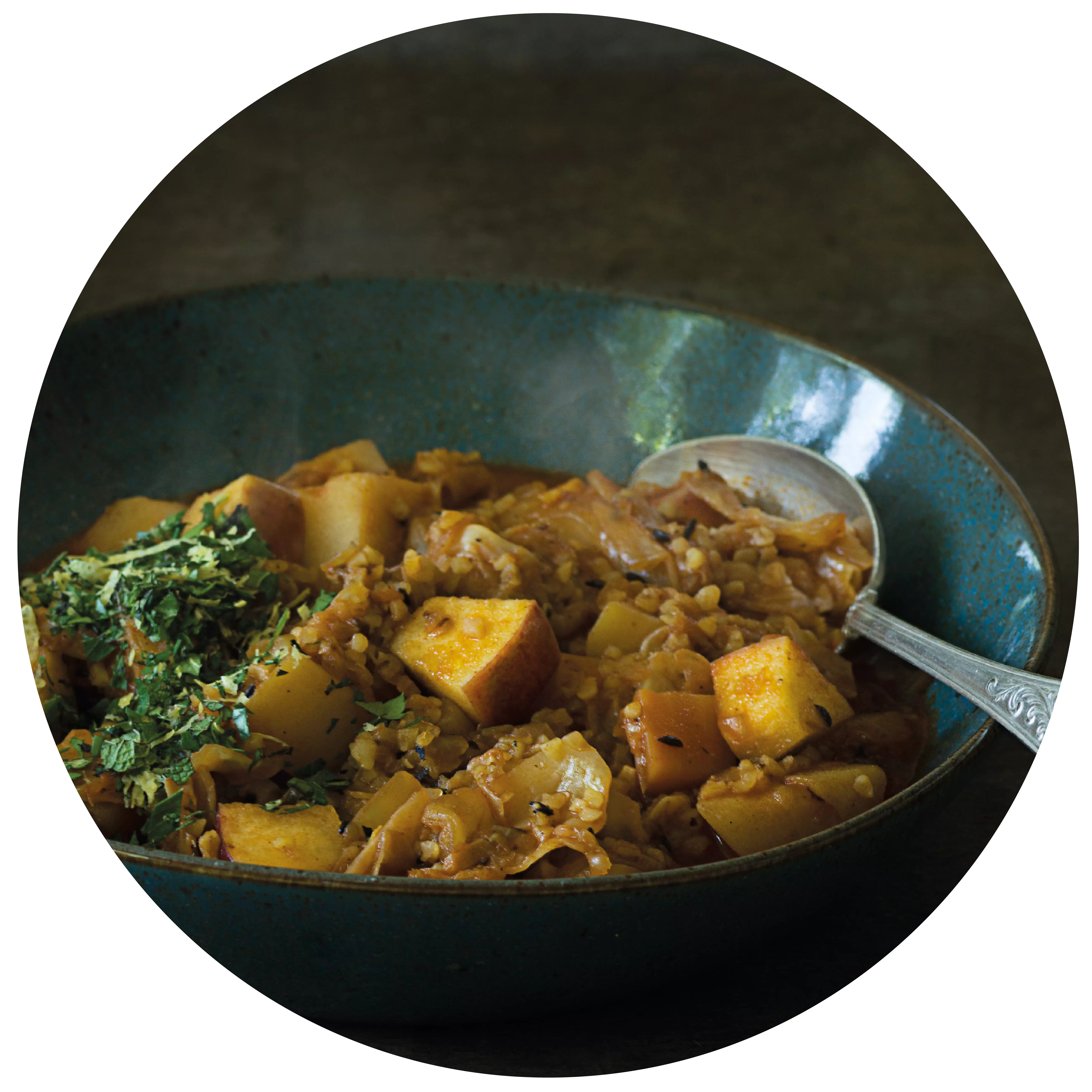
Stuffed, with paprika and pecorino Schnitzel rolls
Stuffed escalope rolls with paprika and pecorino
- Nach Belieben Pinienkerne, Basilikum, Knoblauch
- 8 Stück dünne Schweineschnitzel á ca. 75g & Holzspießchen
- 1 Glas rote geröstete Paprika
- 100 Gramm Pecorino-Käse
- Nach Bedarf Olivenöl, Salz, Pfeffer
Roast the pine nuts and leave to cool. Pluck the basil leaves and place in a blender with the finely chopped garlic, olive oil and pine nuts and blend gently. Finely grate the Parmesan and mix in. Season to taste with salt and pepper.
Wash the meat and pat dry. Drain the paprika in a sieve and finely grate the pecorino. Season the escalopes on both sides with salt and pepper and spread 1 tsp of pesto on each. Cover the escalopes with paprika, leaving approx. 3 cm free on one narrow side of each piece.
Spread the pecorino over the paprika. Roll up the meat from the coated side and pin in place with wooden skewers. Grill the escalope rolls on the barbecue for 20-25 minutes, turning if possible, and indirectly for the last 10 minutes.
- Spätburgunder / Pinot Noir (trocken)
- Lemberger (extra brut)
- Portugieser (trocken)
